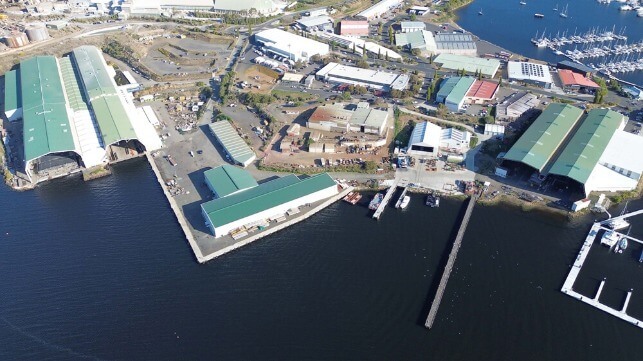Incat to Double Shipbuilding Capacity with New Facility in Tasmania

Tasmania-based shipbuilder Incat, a pioneer in aluminum catamarans, is doubling its production capacity with the acquisition of a second site located northwest of Hobart. The expansion is part of the company’s anticipated demand for sustainable shipping as it develops the world’s largest electric ferry.
The new facility is part of a planned major economic hub in Southern Tasmania. Incat reports it acquired a 12-hectare site as part of the 565-hectare Norske Skog Boyer Mill site in Boyer, Tasmania. The additional facility will permit Incat to double its workforce and production capacity and will include a 240 by 120 meter (790 by nearly 400 foot) production facility. It will give the company the capacity to build three large ships at one time and with nearly 30,000 square meters of undercover production area. Combined with the original facility, the new yard will mean Incat has around 100,000 square meters of production space.
“The new site, which already has the appropriate industrial zoning, will allow us to construct hulls and decks for our vessels at Boyer and then transport the structure down the River Derwent to our existing Prince of Wales Bay shipyard to be completed,” explained Stephen Casey, CEO of Incat. “This will streamline our vessel construction process and enhance our ability to produce multiple ships per year for the market.”
The company which delivered its first aluminum catamaran in 1990 highlights it has been at the forefront of maritime innovation for more than 40 years. They look at the expansion as a key part of a strategy to leverage their expertise over the next five to 10 years to develop the market for large electric ships.

that matters most
Get the latest maritime news delivered to your inbox daily.
“I predict more than 1000 new sustainable ships will be needed to satisfy the global market over the next decade,” said Incat Chairman Robert Clifford. “Domestically there will be a need for more vessels in locations such as Sydney Harbor, and in Europe, there will be a need for much larger vessels of up to 170 meters in length with the capacity to carry up to 1000 passengers. Incat is one of the few shipyards in the world capable of constructing large, lightweight, electric ships to meet that demand.”
They expect to begin vessel construction at the new facility in 2026. Norske Skog Boyer Mill will use a portion of the area for its manufacturing of paper products including newsprint and magazine-grade stock. They also hope to attract new industries such as renewable energy and advanced manufacturing as part of the economic development of the region.
